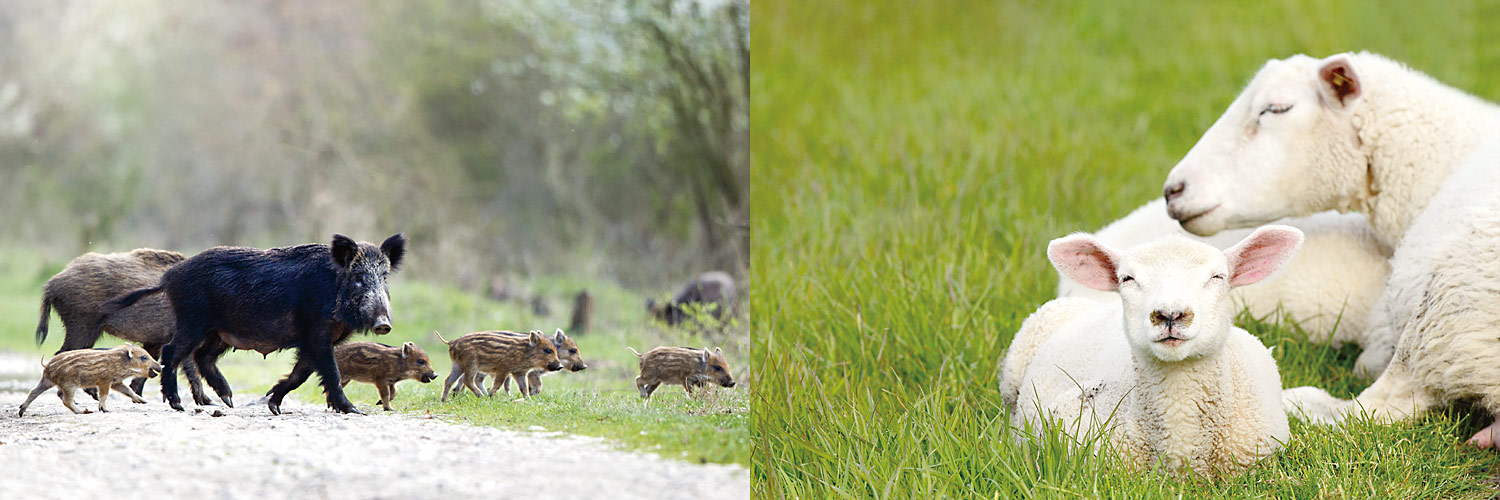
To newborns, their mom is everything. There is nowhere they feel safer than in the arms of their mom. It is said that “kangaroo care” was developed in a public maternity of Bogota, Colombia, to make up for the lack of incubators in 1978 when the mortality rate of premature infants was high. According to this method, a mother holds her baby naked against her bare skin to keep the baby’s body temperature warm. The wrapping of your infant into your chest looks very much like a mother kangaroo holding her baby in her pouch, which is where the name kangaroo care comes from.
Kangaroo care is also called “the miracle of a mom’s chest.” That’s because just placing a baby on the mom’s chest so the baby can smell her scent and feel her warmth helps drastically reduce infant mortality and it is also very effective in treating premature babies. What is the secret of the mom’s scent from her warm chest?
Moms recognize their children by scent
Most mammals lick their newborns to remove the amniotic fluid from their body surface, which helps their body temperature steady. During this process, a large amount of saliva covers their whole body. As the saliva evaporates, its smell and the substances in it still remain and function as pheromones. In other words, a mother’s pheromones on her newborns help her distinguish them from other newborns.

Boar piglets start to follow their mother from the day after they are born. They locate and call each other by grunting. When the mother senses danger, she lets out a shriek. This allows her piglets to quickly hide in a bush nearby or in their nest. When this happens, the mother identifies her own piglets through smell. If other piglets approach her own, she bites or attacks them.
Imprinting is critical for ewes; in a crowded, jostling environment, these animals must learn to recognize their lambs before they lose them in the herd. Thanks to the sheep’s sense of smell, most ewes recognize their own lambs within thirty minutes of birth; by smell they recognize their young. Smell is remembered for a lifetime; it plays a strong role in bonding for the mothers and their young. So, if an ewe is prevented from sniffing her lambs in the first hour after their birth, it is very likely that she will abandon them or nurse other lambs, mistaking them for her young.
Humans, too, have a special ability to distinguish their own children by smell. Mothers can identify their own children simply by smelling T-shirts worn by their children. How do moms have such an astonishing sense of smell?
Dr. Samuel Weiss and his team members at the University of Calgary in Canada published their findings in Science—a renowned international scientific journal—in 2003; they said they had discovered in experiments on mice that, in early pregnancy, a huge burst of incipient neurons—stem cells—are produced in the forebrain. These cells then migrate to the olfactory bulbs, the brain structures that interpret smells. Scientists have assumed that newborn neurons play an important role in a mouse’s ability to recognize her own young by smell. According to scientists, the same thing also happens to human mothers, so they can distinguish the smell of their own newborn babies from that of other newborns.
The scent of a mother is a safe signal for her baby to perceive her presence
Not only does a mom recognize her child by smell, but the baby really loves her smell, too. Newborns have a much stronger sense of smell than adults. Moreover, since they cannot accurately identify their mothers by using their senses of hearing and vision until they reach three to four months, they feel their mother’s presence with a keener sense of smell than any other senses. Especially, they feel most comfortable with their mother’s amniotic fluid, which they have smelled in the womb, and her breast milk.

They feel safe in their mother’s arms through her eyes full of love, her voice, and her heartbeats. This feeling of safety helps them trust that she will always be there for them. The emotions and feelings they have toward their mother become representative impressions they have of others, which allow them to trust other people and approach them even after they become adults. In other words, the attachment bond formed between a mom and her child has a great influence on the child’s interpersonal relationship later in life.
Attachment, the emotional bond between the child and the caregiver, is formed when the child feels satisfaction and joy in a close and constant relationship with the caregiver. When babies develop a secure attachment bond, they freely explore their surroundings, even in an unfamiliar situation, as long as they are with their mom. They cry or look for their mom when she leaves, but they trust that she will come back.
One of the easy ways to create a secure attachment with your baby is to let the baby smell you. When the baby smells something familiar and comfortable, happiness hormones are released and make the baby feel secure, which greatly influences the baby’s emotional development. This is why you should give your baby enough chances to smell you during the first three years of life, which is a critical period for the baby’s development.
So, although another caregiver can nurture your baby instead of you, it is just a formality; she cannot provide emotional stability for the baby without the mom’s smell. In an environment without the mom’s smell, the baby perceives the mom’s absence and feels insecure. Being with the person who has the mom’s smell—the mom herself—can provide optimum security for the baby.
Fresh grass scent, smell of sweat and dirt that is smeared on clothes, smell of make-up, etc.
All these are the expressions for the mom’s scent, although they seem so different from one another. The mom’s scent, which brings back a vague childhood memory, presents peace and comfort to everyone. The scent you smelled in your mother’s arms when you were a baby might have disappeared from your memory, but it is the fact itself that your mom, who is the world to you, is right there for you.
Moms can accurately identify their babies by smell alone, and the babies remember their mom’s smell that they smelled in the womb. A mother and her child confirm each other’s identity even by the indistinct smell. What is God’s profound will for their relationship?
“For you will nurse and be satisfied at her comforting breasts; you will drink deeply and delight in her overflowing abundance . . . As a mother comforts her child, so will I comfort you; and you will be comforted over Jerusalem.” Isa 66:11–13
- Reference
- Ellison, Katherine. 2005. The Mommy Brain: How Motherhood Makes Us Smarter. New York: Basic Books.
- Lee, Hyeon-su. 2013. 하루 3시간 엄마 냄새 [The Mom’s Scent for 3 Hours a Day]. Korea: Gimm-Young Publishers.